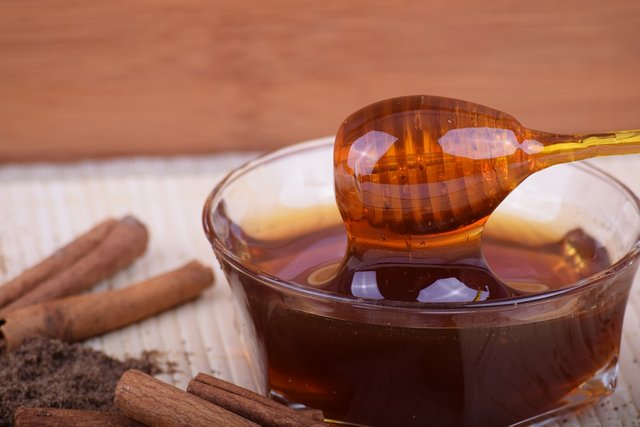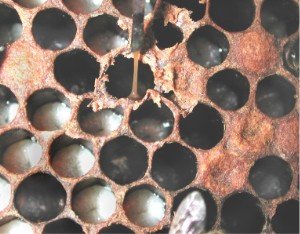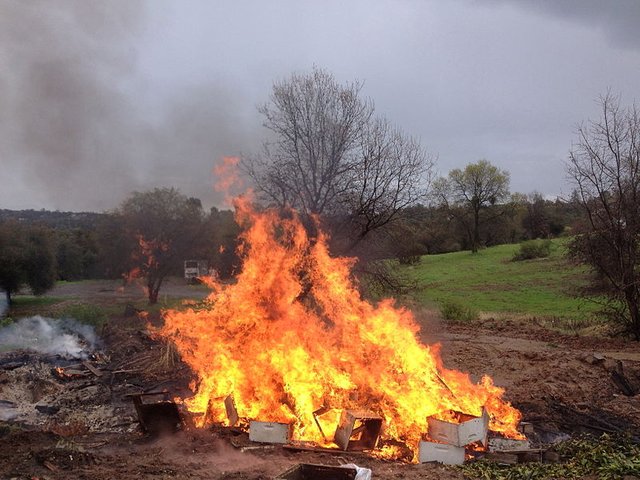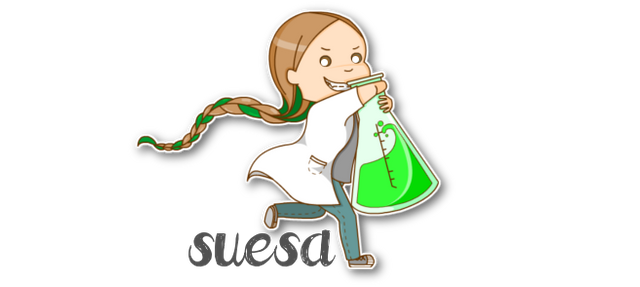
Maybe you read the title and immediately knew what this post will be about. Most likely, you do not.
After my last post about Apis mellifera, @gandalf sent me a picture of the bee he had been feeding - with some honey. The image alarmed me, but he reassured me that the beekeeper he got it from was trustworthy and the bee wasn't in any danger.
What's the problem with feeding bees honey, you ask?
Foulbrood.

Foulbrood is a disease that causes beehives to collapse. In the picture above, you can see the typical pattern of an infected hive, with dark, infected larvae next to the white, healthy ones, and sunken in caps.
Actually, it's two diseases, European and American foulbrood, but the effect is roughly the same. The bees die as larvae, inside the hive, and turn into smelly goo.

wikipedia.org: Cuadro con Loque americana by user “Pollinator”
Let's have a closer look at those two very similar diseases, shall we?

European Foulbrood1

European foulbrood is caused by the bacterium Melissococcus plutonius and affects very young larvae, usually 4-5 days old. That means an infected adult bee does not actually die, it only carries the bacterium into the hive and transmits it to the offspring.
There doesn't have to be a lot of bacteria to kill the larva, which makes it so dangerous. The infection starts in the gut, where the bacteria multiply. Finally, the larvae die, turn from white to yellow to brown and then start decomposing.
If the process happens before the cell in which the larva develops is sealed (they stay open for a few days and are then closed with wax), the dead larva is removed by the bees. If not, the cap starts sinking in after the larva died.

American Foulbrood2

European foulbrood is already pretty bad, but American foulbrood is even worse. Why?
The bacteria causing this version of foulbrood are called Paenibacillus larvae and it can do something that's very bad for the bees (and the beekeepers trying to get rid of it): It can form spores.
Bacteria that form spores can basically go into a sort of "hibernation", during which it is very difficult to kill them. And these spores? They can survive for decades and are highly infectious.
Again, the infection is only dangerous to larvae, not to adult bees, and it's most dangerous during the early stages, about 12-36 hours after egg hatching.
So, how many spores does a larva need to ingest to be fatally infected? 100? 1000? No. It can be 10 spores or even fewer.
How fast the infection kills depends on the genotype of the bacterium, as there are four genetically slightly different versions: ERIC I, II, II, and IV.
II-IV kill fast, usually within 7 days. ERIC I takes around 12 days.
At first, you might think that "slow killing" makes ERIC I less dangerous, but it's the opposite! When the larvae die so slowly, worker bees close the cells without noticing something is wrong, allowing the disease to potentially spread. If the larvae die faster, the worker bees can clean up the mess and potentially prevent a further spread.@suesa

How to treat it 3,4

Burn. That. Shit.

Wikipedia.org: Foul Brood Beehives by user Jrmgkia
Okay, it doesn't necessarily have to be that drastic.
If the infection with European foulbrood is not that extreme, the hive can either be treated with antibiotics are the "Shook Swarm Procedure" can be used. This procedure basically means that you first get everything clean (don't touch clean hives with infected gloves), set up a new hive (clean equipment!) and literally shake the bees off into the new hive.
The old frames are then destroyed (preferably burnt) and the hive treated with antibiotics. It's a bit stressfull but effective.
If 50% or more of the hive are visibly infected, everything has to be destroyed.
American foulbrood can also be dealt with by using the "Shook Swarm Procedure", but it's even more important to ensure everything is clean. Remember, those spores can last decades!
There are countries that require you to just burn the whole hive, because the danger of transmission is too big.

But what's with the honey?

Spores. They're in the honey.5
Of course, not all honey you buy has American foulbrood spores. And even if, they're not dangerous to you. There are potentially Clostridium botulinum in it that are dangerous for very small children, but in general, honey is relatively safe for human consumption.
The problem is, you do not know where that honey is from. You do not know how careful the beekeeper was. You do not know if there are spores in there, that could wreack havoc on a whole hive.
You just don't know.
So if you encounter a tired bee that you really want to help, get out some sugar water.
Don't feed it honey, if you don't know 100% that it's safe and you won't eradicate someone's colony.
Sources:
1European foulbrood in honey bees
2American Foulbrood in honeybees and its causative agent, Paenibacillus larvae
3The Control of European Foulbrood
4Diagnosing and Treating American Foulbrood in Honey Bee Colonies
5American Foulbrood

Signature by @atopy
I had no idea that it could be dangerous. Poor bees are attacked from every direction, aren't they? It's a wonder we still have any left!
Downvoting a post can decrease pending rewards and make it less visible. Common reasons:
Submit
I'm just thinking how difficult it would be to be a disease. I would have wanted to continue with be's. Beeeeeeeeeeeeeeeeees
How to be effective enough to spread and be a remarkable disease ,but still not being too efficient and kill off everyone. Otherwise it's like you'd eat your house and then freeze to death.
Poor diseases living a tough life.
Downvoting a post can decrease pending rewards and make it less visible. Common reasons:
Submit
I am just here to smh! :D
Downvoting a post can decrease pending rewards and make it less visible. Common reasons:
Submit
Me too! SMH. lol
Downvoting a post can decrease pending rewards and make it less visible. Common reasons:
Submit
Queen of Science;
Me;
Queen of Science;
Me;
It's good to collide with this Science lesson. Hopefully you are doing better than the poor bees ♡
Downvoting a post can decrease pending rewards and make it less visible. Common reasons:
Submit
As I'm not breeding, I can't have foulbrood :'D
Downvoting a post can decrease pending rewards and make it less visible. Common reasons:
Submit
Hahaha! I see what you did there :D
Downvoting a post can decrease pending rewards and make it less visible. Common reasons:
Submit
The problem is thus only related with honey originating from North America, isn't it? Whilst in France, a lot of the available honey is difficult to precisely trace, most of it however originates from Eastern Europe (I would say pfeeww regarding the foulbrood issue). In our case, we have met this morning a local honey producer, and will test it probably very soon :)
PS: I didn't know the word foulbrood, and its French translation did not even help me. I learned something!
Downvoting a post can decrease pending rewards and make it less visible. Common reasons:
Submit
Sadly, it's not only in North America anymore. American foulbrood can come from China too, and some European beekeepers have trouble with it.
In the end it comes down to the question if the beekeeper you're getting the honey from can be trusted to carefully check their hives, and effectively fight potential infections.
Bottom line: don't feed bees honey, but it's no problem for humans (usually).
Downvoting a post can decrease pending rewards and make it less visible. Common reasons:
Submit
The beekeepers we met do not feed the bees with honey. Instead, they are moving the hives in different places, close to different fields. In this way, the bees can help themselves with different flowers/crops/plants every time, and at the producer level, different honnies are constantly made. I like this idea, to be honest.
Downvoting a post can decrease pending rewards and make it less visible. Common reasons:
Submit
There's still a certain danger for the bees, they can attack another hive and rob their honey for example.
A good beekeeper has to regularly check for signs of infection in the hive, that's absolutely necessary.
Downvoting a post can decrease pending rewards and make it less visible. Common reasons:
Submit
I guess they do that (since they are producing honeys for years), but this, I didn't check myself (I am by far not an expert and what matters to me is to buy local, and promote reasoned cultures).
Downvoting a post can decrease pending rewards and make it less visible. Common reasons:
Submit
What an educative post, I can talk about bees with Bee farmers..
Downvoting a post can decrease pending rewards and make it less visible. Common reasons:
Submit
This post earned a total payout of 0.029$ and 0.022$ worth of author reward which was liquified using @likwid. To learn more.
Downvoting a post can decrease pending rewards and make it less visible. Common reasons:
Submit
I used to be "team bee!" and "save the bees" until I realized that here in "America" honey bees are actually ... THE ENEMY. Kind of like cats.
From what I understand, bees that are native to the Americas are great pollinators, but they do not live in colony's and don't produce honey. They make their own little nests and the little bit of honey that they do make if for personal consumption and not to feed the humans.
These "native" bees were doing all the pollenizing before those honey bees showed up, and the honey bees are now making it so that the Native bees get wiped out.
The "white man's flies" are still going rampant!
Thanks for the great post, I loved reading it.
Downvoting a post can decrease pending rewards and make it less visible. Common reasons:
Submit
This post has been voted on by the SteemSTEM curation team and voting trail.
If you appreciate the work we are doing then consider voting us for witness by selecting stem.witness!
For additional information please join us on the SteemSTEM discord and to get to know the rest of the community!
Downvoting a post can decrease pending rewards and make it less visible. Common reasons:
Submit
Great information to pass on. Would be great to have tractability in the market (holly grail in the food industry) to be able to trace the origins. Knowing that it is prevalent in large geographic bee markets is alarming. Yikes.
Downvoting a post can decrease pending rewards and make it less visible. Common reasons:
Submit